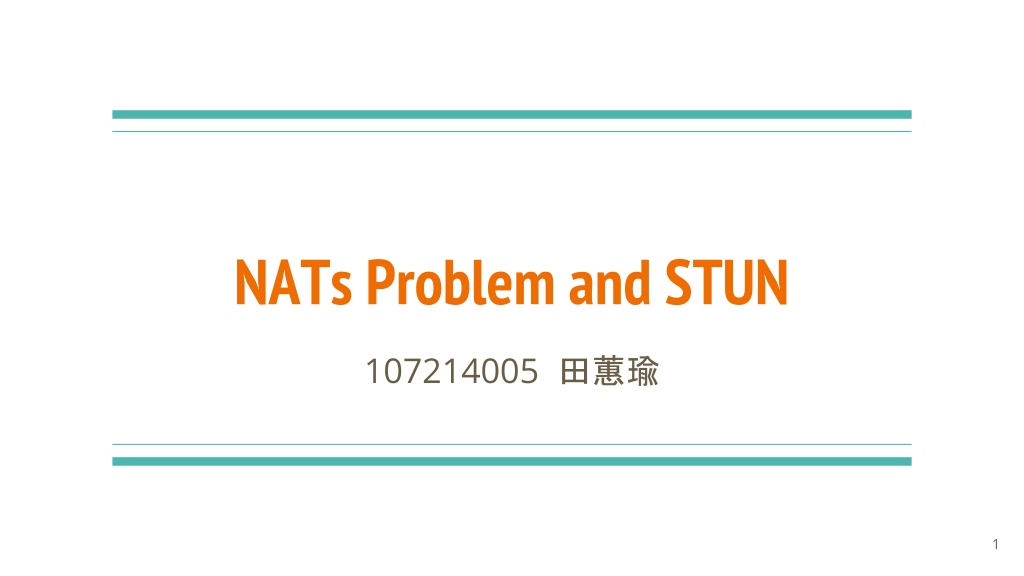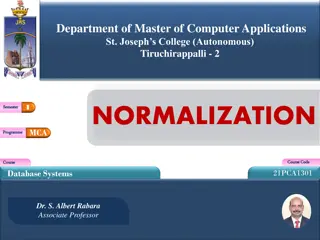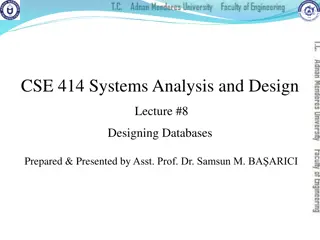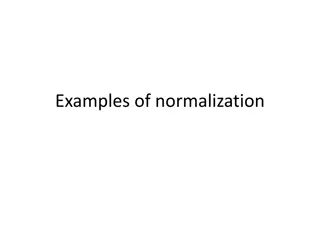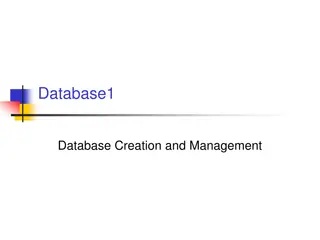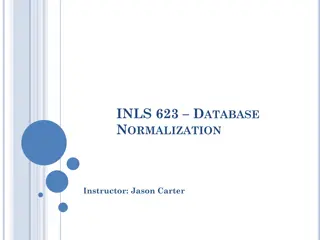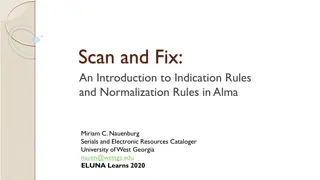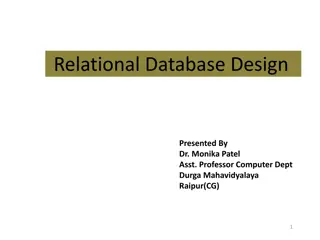Database Normalization Process Overview
Database normalization plays a vital role in optimizing data efficiency and integrity by reducing redundancy. This content covers the importance of normalization, different normalization forms, top-down and bottom-up approaches, and the practical application through ER modeling. Dive into the world of database design with insights from subject matter experts.
Download Presentation

Please find below an Image/Link to download the presentation.
The content on the website is provided AS IS for your information and personal use only. It may not be sold, licensed, or shared on other websites without obtaining consent from the author.If you encounter any issues during the download, it is possible that the publisher has removed the file from their server.
You are allowed to download the files provided on this website for personal or commercial use, subject to the condition that they are used lawfully. All files are the property of their respective owners.
The content on the website is provided AS IS for your information and personal use only. It may not be sold, licensed, or shared on other websites without obtaining consent from the author.
E N D
Presentation Transcript
NATs Problem and STUN 107214005 1
NAT Introduction 2 NAT : Network Address Translation In RFC 3489, there are 4 types of NAT: Full Cone NAT Restricted Cone NAT (Address Restricted Cone) Port Restricted Cone NAT Symmetric NAT
NAT Problem Example 3 Cannot handle embedded IP addresses or ports NAT only translate the TCP/UDP Header Registered UAs Table 101@192.168.2.14:7214 SIP Server 163.22.20.108 Cannot access internal network services from the public network NAT REGISTER : 101@192.168.2.14:7214 UA 101 192.168.2.14 Packet infomation from Reference 6
NAT Solutions 4 Client Gateway Server VPN STUN ALG RTP Proxy (Virtual Private Network) (Application Layer Gateway) UPnP (Universal Plug- and-Play) (Simple Traversal of UDP Through Netwoek Address Translators) RFC 3489 Works except symmetric NAT TURN (Traversal Using Relay NAT) ICE (Interactive Connectivity Establish)
STUN 5 IP: 10.22.22.179 Port: 17349 Client STUN Server IP: 163.22.20.108 Port: 3478 IP: 192.168.0.2 Port:16387 NAT Mapping Table 192.168.0.2:16387 <-> 17349 ( for 163.22.20.108 )
STUN 6 STUN Binding Reponse will include MAPPED-ADDRESS STUN Client IP (after NAT) SOURCE-ADDRESS STUN Server IP CHANGED-ADDRESS STUN Server IP
STUN Demo 7 STUN Server Public STUN Server List stun.sipnet.net:3478 stun1.l.google.com:19302 angela.ncnu.org:3478 STUN Client Webpage Trickle ICE Windows Application WinSTUN
STUN with Symmetric NAT 8 STUN Server IP: 163.22.20.108 Port: 3478 Client Port: 17349 IP: 192.168.0.2 Port:16387 Symmetric NAT Kamailio IP: 163.22.22.67 Port: 5060 Port: 12345 Mapping Table 192.168.0.2:16387 <-> 17349 ( for STUN Server) 192.168.0.2:16387 <-> 12345 ( for SIP Server )
Port Prediction 9 Port Preserving Lots of NATs will allocate a mapped port Usaully the difference of new mapped port is fixed Picture from Reference 2
Reference 10 1. ROSENBERG, Jonathan, et al. STUN-simple traversal of user datagram protocol (UDP) through network address translators (NATs). 2003. 2. GUHA, Saikat; FRANCIS, Paul. Characterization and measurement of tcp traversal through nats and firewalls. In: Proceedings of the 5th ACM SIGCOMM Conference on Internet Measurement. 2005. p. 18-18. GUHA, S., TAKEDA, Y., AND FRANCIS, P. NUTSS: A SIP-based Approach to UDP and TCP Network Connectivity. In Proceedings of SIGCOMM 04 Workshops (Portland, OR, Aug. 2004), pp. 43 48. Midcom, W.G., 2003. Symmetric NAT Traversal Using STUN, draft-takeda-symmetric-nat- traversal-00. txt. IETF (2003-2006). Sending of a SIP message without using STUN protocol Set up your STUN Server 3. 4. 5. 6. 7.
